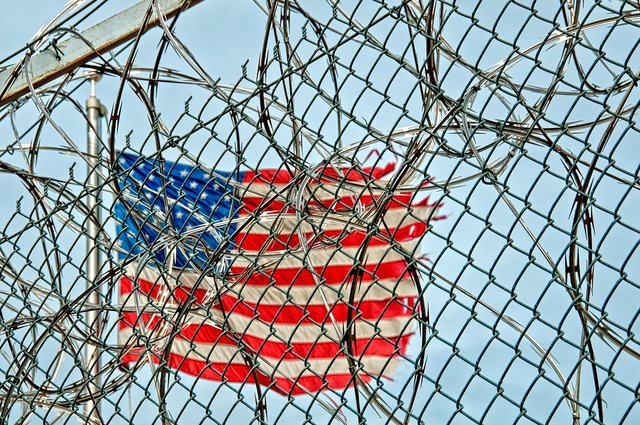ACCUSED AMERICAN ISIS FIGHTER CLAIMS THEY FIRST ARRIVED AS JOURNALIST
Iraq (PT) – An American accused of fighting for the Islamic State in Syria claimed they initiallyarrived as a hopeful journalist. The revelation came after the American Civil Liberties Union (ACLU) battled the Trump Administration over access to the detainee. According to sources, the person had been questioned by interrogators without a lawyer.

The detainee, reputedly a duel American-Saudi Arabian citizen, was captured last summer. As the Islamic State’s stronghold in Raqqa fell, US-backed forces moved in sifting civilians from fighters. Still unnamed, the American detainee was allegedly captured by Syrian Democratic Forces then transferred to the Department of Defense. The group is a coalition of Kurdish and Arab militias,though are likely intermingled with foreign special operations and intelligence operatives.
From there, the Trump Administration denied all access to the detainee while conducting multiple interrogations. The ACLU was blocked numerous times by DoD, which cited the normal laws of arrest don’t apply to a war captive. After being transferred to Iraq, the detainee was finally allowed access to a lawyer via the ACLU. Since then, a declassified document reveals the individual stated they’d arrived to Syria to cover the conflict as a journalist.
The declassified FBI document shows the detainee said they’d been walking through the desert for two days before capture. After encountering an SDF check point, US-backed forces discovered the individual had flash drives containing ISIS administrative documents. In those documents the detainee was listed as a “fighter”. The FBI file claims the detainee also served an administrative role, rented land from ISIS and raised sheep. He’d also guarded an oil field under Islamic State control.
He’d initially arrived in Syria as a freelance writer with work apparently already submitted to US media. They were kidnapped by ISIS three days after arriving in Syria and spent two months in an indoctrination camp. From there he was assigned various tasks, during which time he seems to have attempted escape. These attempts were unsuccessful, however, and he was apprehended by ISIS military police.
Perhaps the most exotic task the detainee cites, according to the leaked document, was being recruited to operate a “device similar to a satellite dish to transmit microwaves that could bring down an airplane”. The detainee, having came to Syria with a degree in electrical engineering, traveled to Raqqa to meet the same individual regarding this special project. According to documents (pg. 37), the pair would meet again to discuss electric bombs. When the detainee declined both these projects, he bought a GPS device in Raqqa which was recovered upon capture.
At some point the detainee sold land and sheep they’d acquired in Syria through ISIS for several thousand dollars due to airstrikes. When he was rejected by refugee groups escaping ISIS, the detainee caught a ride intending to meet SDF. By his third interview with US law enforcement and intelligence operatives, the detainee began emphasizing more that they’d initially arrived to Syria as a freelance journalist hoping to find “the truth” about the war.
The FBI remained unconvinced in documents, however, and dissected every claim by the detainee. A pattern of coincidences blot the detainee’s timeline, including dates about when he left the US, and then Saudi Arabia coincided with the declaration of the ISIS caliphate, and other key events related to the terror group. The detainee’s internet search histories and social media activity is also mentioned as evidence against them. However, it’s unclear if these were due to US surveillance or surrendered data. Thus far, it appears the government is focused on proving the detainee joined ISIS, and received monetary compensation and rank for their service.
Currently the ACLU has a haebeas case to push the court to the rule the detainee’s captivity as unlawful. What concerns the national lawyers guild most is the Trump Administration’s efforts to keep the detainee without charge or a lawyer. The precedent “violates the constitution’s guarantee of due process.”
The detainee’s claims that they initially arrived as a freelance journalist also adds a layer of complexity. Reporting on the Syrian War has become extremely risky, and writers come up missing all the time. If the detainee’s story is true, then how many more reporters were perhaps captured and forced onto the front line by ISIS? If the ACLU is unsuccessful in upholding the US citizens rights, could there be repercussions for policy at home?
This article was prepared by Isiah Holmes for The Pontiac Tribune.